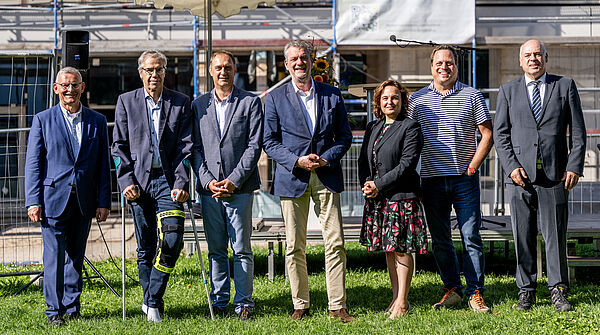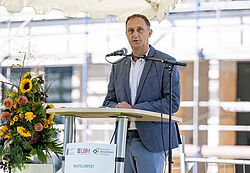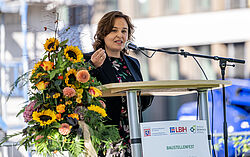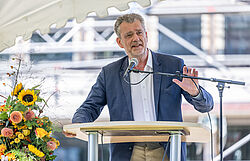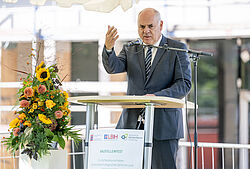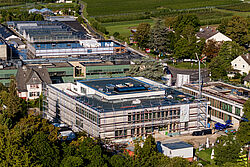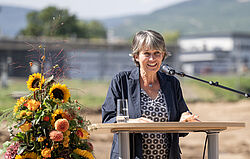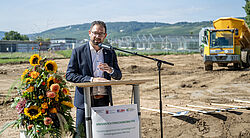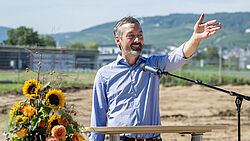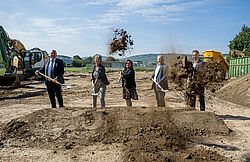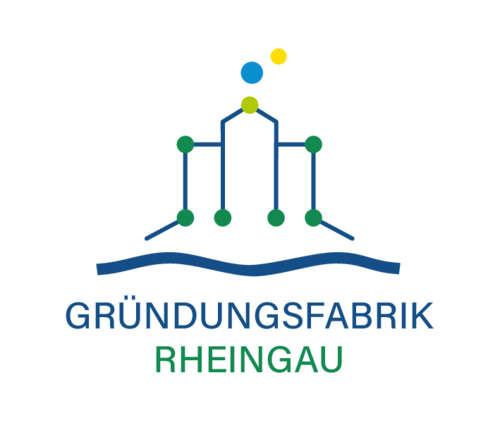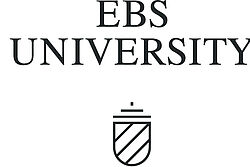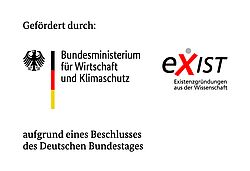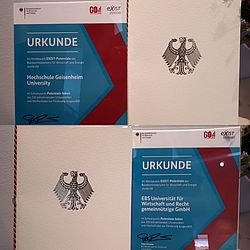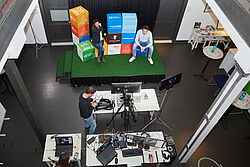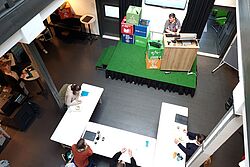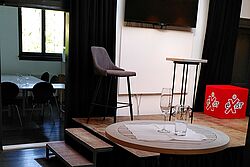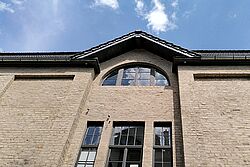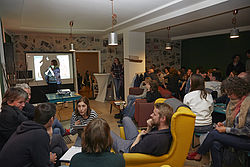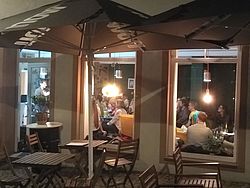“Ten years after the university was founded, it has made tremendous progress, which can be seen on the campus as well. With the construction of three new buildings, we are celebrating a major milestone in the development of the campus,” said Ayse Asar, State Secretary in the Hessian Ministry of Science, Research and the Arts, as well as Dr. Martin Worms, State Secretary in the Hessian Ministry of Finances. Representing the Hessian state government, they celebrated the progress withUniversity President Prof. Dr. Hans Reiner Schultz, the Director of the State Office for Construction and Real Estate (LBIH)Thomas Platte and other guests.
Teaching and research at Hochschule Geisenheim University are very successful, which is also reflected in the rapid increase in student numbers. But this positive development also means that the university needs new facilities with enhanced capacity,” explains State Secretary Worms. “The new buildings will create these capacities and provide the university with the right infrastructure for a successful future. Through HEUREKA, the state government's university construction program, we were able to provide a total of around 65 million euros for the three new buildings. With this program, which has been running since 2008, we will invest a total of more than 100 million euros in the university's infrastructure by 2031. I am convinced that these investments will contribute to the long-term successful development of the institution and the entire higher education landscape in Hesse. Many generations of students and researchers will continue to benefit from them in the future."
The new Lecture Hall Building will house a large auditorium and several seminar rooms. Located at the new campus entrance and future central campus square, its distinctive design will make it as much a flagship of the university as the new Beverage Technology Center (GTZ), which will combine hands-on training, teaching and research in a unique way. In addition to beverage technology students, students from other faculties and trainees will also benefit from the best conditions for teaching and research.
“Distinctive concrete parts, prominent wood elements and large glass panels will characterize the new Lecture Hall Building. The two-story building will be defined by a strong wood and glass façade surrounding the supporting structure. Today, we can already see the future shape of the building. The same is true for the Beverage Technology Center. As the state's central construction and real estate service provider, we are also pleased to celebrate the groundbreaking for the VITA Research Center. The building will have a rectangular shape with a staggered floor on top, which will house the heart of the project – so-called ecotrons. These prototype greenhouse units will have a major impact on the shape of the building. I hope that all three projects will continue to progress positively and without accidents,” said LBIH DirectorThomas Platte.
After celebrating progress on the GTZ and Lecture Hall Building, Ayse Asar symbolically broke ground on the new Viticulture Adaptation Center for Sustainability and Climate Change, or VITA. It will be located south of the GTZ and north of the railway line. In four research groups, scientists will study how climate change affects plant metabolism, interactions between vines and associated organisms, ecosystem functions, and water and nutrient flows in the vineyard. With this knowledge, they aim to develop plant or microbial-based products that improve plant and soil health and make vines more resilient.
“The groundbreaking ceremony for the new science building will significantly strengthen the research infrastructure in Geisenheim and is an important contribution to the future of viticulture. In view of the fact that we cannot solve the great challenges of our time without scientific support, this is a milestone in the development of the university,” explained State SecretaryAyse Asar. Global challenges such as climate change, sustainability and biodiversity loss affect the cultivation of special crops, particularly the wine-growing industry. The new science building will house a unique infrastructure to analyze the impact of climate change on crops, biodiversity and ecological interactions in viticulture. The goal is to develop sustainable products that improve plant and soil health and make vines more resilient to climate stressors. Viticulture is already affected by climate change through extreme weather events, pathogens and rising temperatures. In the new science building, experts will work on innovative solutions to adapt viticulture to changing climate conditions. In this context, an interdisciplinary approach is key. We are very proud of the recommendation of the German Council of Science and Humanities for funding a science building at a new type university, which also demonstrates the outstanding research excellence of the university.
Based on the decision of the Joint Science Conference (GWK), the construction costs of more than 30 million euros will be equally shared by the federal and state government. The research center with offices, laboratories and plant breeding infrastructure will accommodate 25 researchers from the four research groups. As key components for all planned research activities, the VITA Research Center will include phytotrons and ecotrons (climate chambers for simulating natural conditions for plant physiological and plant ecological experiments). In these chambers, factors such as light intensity, temperature and humidity can be adjusted to allow researchers to study how grapevines will respond to expected future climate conditions. The new building is scheduled to be handed over to the university in 2026.
“The construction progress is a testament to the positive development of our academic programs and research departments since the university was founded ten years ago. The new Lecture Hall Building will provide a modern infrastructure for our growing student population, and the Beverage Technology Center will enable us to train young professionals with state-of-the-art facilities. Likewise, our new degree programs and research areas will benefit from our Food Safety Laboratory Building and the Logistics and Sustainability Building,” said University President Prof. Dr. Hans Reiner Schultz. “The VITA Building will give us the opportunity to study the effects of climate change on viticulture in even greater detail and to develop sustainable adaptation strategies using innovative methods. Our outdoor and greenhouse areas, as well as our existing and projected living labs, enable us to test these strategies under real-life conditions and develop future-oriented solutions for viticultural practice.”
Source: Joint press release of the Hessian Ministry of Finance and the Ministry of Higher Education, Research and the Arts.
Pictures: Torsten Silz





